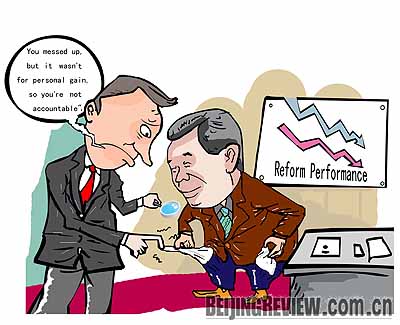|

Government officials in southwest China's Chongqing Municipality are being given the benefit of the doubt for misdemeanors. A recently issued regulation states that officials who have made mistakes and incurred losses in the process of reform can be exempted from accountability as long as their motive wasn't personal gain and they acted in accordance with the law.
In 2008, Chongqing was designated as a pilot area of the comprehensive reform for coordinated and balanced urban-rural development. The Central Government granted the municipality the right to take initiatives in dealing with local reform issues. This paved the way for Chongqing to introduce the new fault-tolerance system.
For years, supporters say, innovative reformers are likely to be ostracized after making mistakes or incurring losses while pushing forward reform. As a result, less and less officials have been willing to take the plunge and be creative. They believe that the more tolerant attitude toward reform attempts in Chongqing will allow forward-thinking officials to try new ideas with less fear of persecution.
However, some people warn, although the accountability exemption system is reasonable to some extent, it will quite possibly result in big losses and damage the government's image if there is no scientific ways to monitor the process. There must be some restrictions, or the system will become a shield for irresponsible officials to feather their own nests and deflect accountability, they say.
At the same time, some legal experts are not sure whether the new Chongqing regulation breaks any of the country's basic laws or not, because the law covering this process stipulates that officials who incur losses to state assets and/or public interests will be punished according to the degree of the loss. Therefore, the experts call for the establishment of a transparent monitoring system for the government's implementation of big projects and social programs, such as using Internet forums for public feedback. This kind of monitoring is expected to minimize negative effects reform might cause.
Reform needs tolerance
Deng Xuezhi (www.xinhuanet.com): China's successful reform and opening-up drive in the past 30 years is based on innovation and trial and error. As all technological progresses come after hundreds and even thousands of trials, the success of reform policies can only come in this way too. We cannot expect that every reform attempt will achieve the optimum result. Thirty years' history proves this. Therefore, Chongqing's fault-tolerance system is a big step in the right direction.
In retrospect, many important policies on reform and opening up are adopted in disputes and gradually improve in the process of practice. At the same time, we also notice that some officials have to give up their ideas because of setbacks they suffered in the process of reform. It's because reformers are told to get it right at the first attempt that the heavy pressure dissuades them from trying something new. We are lacking in an effective protection system for reformers.
Although nowadays officials can receive some protection from their superiors when trying new reform measures, this is not legal protection. Chongqing's fault-tolerance system, however, is making this protection legal and this is bound to make a big difference on pushing forward reform and opening up.
Zhang Yongqi (www.eastday.com): As people always say, we must tolerate errors in the process of reform and opening up. As long as an official does not deliberately risk public interests for personal gains, we should not be too tough with them.
However, to tolerate faults is not to condone them. To ensure that the accountability exemption system works, we must have a good understanding of it.
First of all, the fault-tolerance system does not mean officials are allowed to continue with a new initiative knowing it won't work. Instead, this system means in the event of a reform program failing to achieve expected results, the tolerance allowed will prevent the enthusiasm of reformers from being dampened.
Second, tolerance is not encouragement. The fault-tolerance system encourages officials to make brave attempt to push forward reform. To read tolerance as connivance and encouragement is a misunderstanding of this system.
Third, not all errors are to be tolerated. The precondition is that officials do things in accordance with the law and has no selfish motive. As for those who waste public resources and funds for personal gains, the fault-tolerance system will not shield them. Instead, they will be severely punished.
Gao Fusheng (www.cnhubei.com): In the context of reform and opening up, this accountability exemption regulation is a good idea. For a long time, many local governments have debated if this system is reasonable or not. Chongqing has now created a favorable environment for innovation and creativity. With the backing of the fault-tolerance system, pilot programs can proceed without the fear of failure.
| 